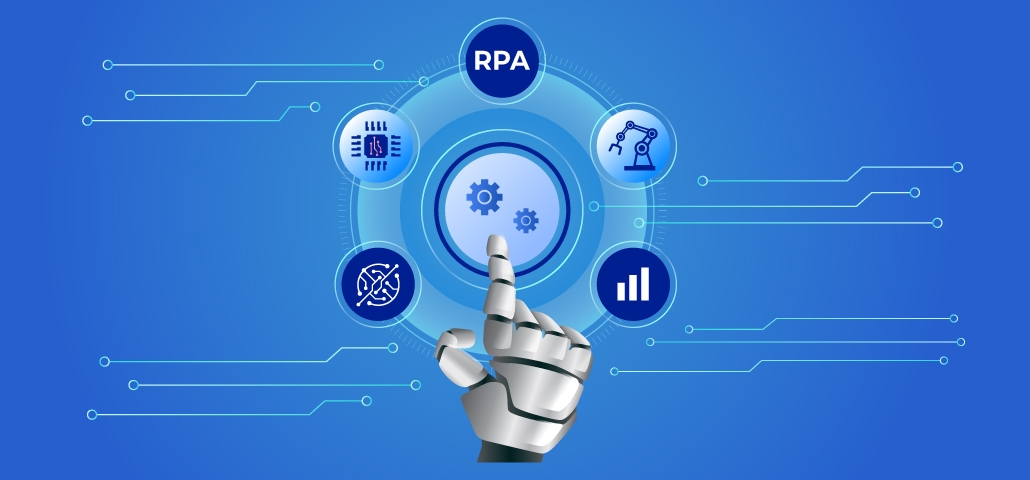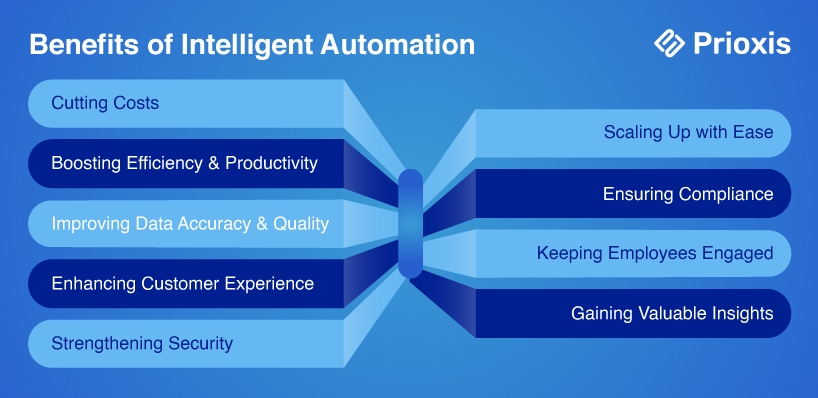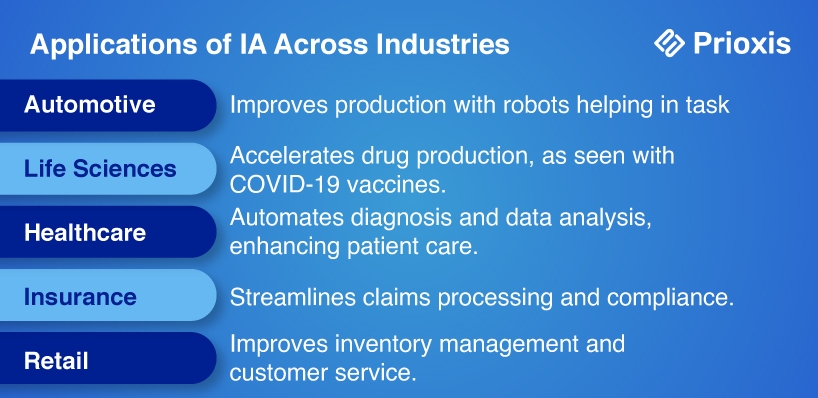A Beginner’s Guide to Intelligent Automation in 2025
 Admin
Admin Digital Transformation
Digital Transformation Aug 29, 2024
Aug 29, 2024

Table of Content
Imagine a world where machines handle repetitive tasks, leaving humans free to focus on creative and strategic work. Thanks to intelligent automation (IA), this world isn’t science fiction; it’s a reality.
IA combines cutting-edge technologies like Artificial Intelligence (AI), Robotic Process Automation (RPA), and Business Process Management (BPM) to streamline business processes, improve efficiency, and enhance decision-making across industries.
What is Intelligent Automation?
Intelligent Automation (IA) is a type of automation that uses AI with RPA to help businesses automate complex tasks that once needed human thought. Unlike simple automation, which follows rules, IA can think, learn, and adjust to new situations. This helps businesses grow, save money, and reduce mistakes.
For instance, a car manufacturer might use IA to speed up production lines and cut errors. A pharmaceutical company can use IA to reduce costs and increase efficiency in drug development. Whereas an insurance company can use IA to automate tasks like calculating rates, processing claims, and ensuring compliance with regulations.
Advancing Automation: How RPA is Evolving into Intelligent Automation
When it first appeared, Robotic Process Automation (RPA) was a breakthrough technology. It allowed businesses to automate repetitive tasks. For instance, data entry, form filling, and more (using software robots that mimic human actions).
However, RPA has its limitations. It runs best in stable environments where the tasks are repetitive, and the conditions do not change. If there’s a change in data format, user interface, or integration requirements, RPA systems can break down.
This is where Intelligent Automation (IA) takes automation to the next level. IA not only automates tasks but also incorporates AI and machine learning. AI makes it adaptable and able to handle more complex scenarios.
Unlike RPA, IA can process unstructured data and learn from new information. It can also make decisions based on real-time data analysis. This flexibility allows you to use IA in dynamic environments where conditions often change.
Cloud-based IA takes automation further by using cloud technology to overcome some of RPA's limitations. Cloud-based IA uses a network of API connectors hosted in the cloud. These connectors are like digital highways that allow different software applications to "talk" to each other and share data.
These API connectors perform specific actions and respond to real-time event triggers. They create smooth “data corridors” between applications. This connectivity automates workflows across many platforms without breaking down when changes occur. You gain even greater power and flexibility by integrating AI and machine learning into these workflows.
Thus, with IA, even non-engineers can create and change automation without relying on technical teams. This makes it easier for businesses to launch and adapt automation.
The Strategic Importance of Intelligent Automation in Challenging Times
In today’s uncertain economy, operational excellence is crucial for businesses. Many organizations are now cautious about investing in new technologies unless they deliver immediate and large value. This situation makes Intelligent Automation (IA) especially attractive. It helps businesses reduce costs and improve efficiency without needing large upfront investments.
IA boosts agility and streamlines processes, making it a vital tool for businesses that want to stay competitive. By automating routine tasks and improving operations, IA cuts costs and creates new opportunities for growth.
How Intelligent Automation Works
Intelligent Automation combines three key technologies:
Artificial Intelligence (AI)
AI is the “brain” of IA. It uses machine learning and intelligent algorithms to look at data and help businesses make better decisions. AI makes IA "intelligent," as it lets the system learn and improve over time.
Business Process Management (BPM)
BPM, also known as business workflow automation, automates and improves workflows. It ensures that tasks are done the same way every time, improving businesses' operations.
Robotic Process Automation (RPA)
RPA uses software robots to handle routine tasks like entering data or processing invoices. When combined with AI, RPA can do more complex tasks, like working with unstructured data and making decisions.
Examples of Making Automation “Intelligent”
One aspect of Intelligent Automation is its ability to handle complex tasks beyond simple automation. Let's understand this with some examples.
Boosting Mortgage Sales with Smart Automation
Intelligent Automation predicts when customers might need a mortgage. Analyzing data like income changes or new jobs finds the best moment for a personalized offer. This prompt insight helps bankers reach out at the right time, making sales smoother and more effective.
Simplifying Procure-to-Pay
The Procure-to-Pay (P2P) process can be tedious, from vendor selection to invoice processing. Intelligent Automation simplifies these tasks by integrating data from various sources. It reduces manual effort, speeds up processes, and makes operations more efficient.
Streamlining Onboarding and Offboarding
Starting or leaving a job involves plenty of paperwork and coordination. Intelligent Automation handles these tasks, ensuring a smooth onboarding and offboarding experience. It manages paperwork, schedules, and tasks, helping new hires settle in faster and making departures seamless.
Smarter CRM Management
Intelligent Automation enhances Customer Relationship Management (CRM) by automating follow-ups, data entry, and audience segmentation. This allows your sales team to focus on building relationships and closing deals. It also keeps customers satisfied and your sales pipeline strong.
Effortless Inventory Management
Tracking inventory, especially in complex supply chains, can be overwhelming. Intelligent Automation helps by automating order generation, inventory tracking, and shipment management. This reduces errors and ensures accurate inventory records, keeping your products in stock and orders fulfilled without issues.
Easier Invoice Management
Invoices can be tedious and error-prone, but Intelligent Automation streamlines the process. Automating data capture, validation, and approval routing reduces errors and speeds up payment cycles, keeping your finances on track.
Consistent Quality Control
Maintaining quality standards can be challenging with manual processes. Intelligent Automation improves quality management by providing real-time data and automating testing. This allows your team to catch and resolve issues faster, reducing costs and ensuring top-quality products.
Quick and Easy Refunds
Waiting for a refund is frustrating, but Intelligent Automation speeds up the process. Retailers use it to automate data extraction and transaction verification, cutting refund times and boosting customer satisfaction.
How to Get Started with Intelligent Automation?
Automation begins with a deep understanding of the processes you want to automate. This involves data mapping and the digital representation of real-world processes. In other words, data mapping turns complex business processes into organized data sets. The data sets can be stored in applications and databases.
For example, you may record your business's customer interactions as data points within a Customer Relationship Management (CRM) system. These interactions include emails, calls, purchases, and more. By mapping out these interactions, businesses can see the entire customer journey in a structured way.
You can pinpoint which tasks are automatable once you map these processes onto IT systems. This strategic step is essential because it helps find where automation will most impact, such as streamlining sales processes, automating HR tasks, or improving financial workflows.
The Benefits of Intelligent Automation
Intelligent Automation offers a wide range of benefits that can transform business operations:

Cutting Costs
Intelligent Automation is a great way to reduce expenses. It can cut costs by up to 75% in industries like finance. Many companies save about 40% each year by speeding up processes and reducing the time spent on routine tasks. This means more money can be saved and used to grow your business without increasing overheads.
Boosting Efficiency and Productivity
Intelligent Automation helps your team focus on important tasks by taking over repetitive ones. This frees up time for employees to work on projects that matter. Some companies save up to 90% of the time they used to spend on manual tasks, leading to better productivity and higher job satisfaction.
Improving Data Accuracy and Quality
Human errors are common in data entry, but Intelligent Automation can help reduce those mistakes. By automating data-related tasks, companies can achieve higher accuracy, which leads to better decision-making and more precise business insights.
Enhancing Customer Experience
Fast and reliable service makes customers happy. Intelligent Automation ensures quicker response times and consistent service. For example, automated systems like chatbots can handle many customer inquiries, reducing wait times and improving customer satisfaction.
Strengthening Security
Security is crucial in today’s digital world. Intelligent Automation helps prevent fraud by analyzing data to spot unusual activity. This lets your team respond to potential threats, keeping your business and customers safe.
Scaling Up with Ease
Intelligent Automation can handle the increased workload as your business grows without any issues. These systems are designed to scale with your business, ensuring that operations stay efficient even as processes become more complex.
Ensuring Compliance
Staying compliant with industry regulations is easier with Intelligent Automation. It ensures accuracy and traceability in every process, helping you meet regulatory standards without hassle. Built-in governance features make sure your business stays on the right track.
Keeping Employees Engaged
Nobody enjoys doing repetitive tasks. Intelligent Automation takes care of these, allowing employees to focus on more meaningful work. This not only improves job satisfaction but also helps keep talented employees.
Gaining Valuable Insights
Intelligent Automation doesn’t just automate processes—it also generates data that can offer essential insights. Analyzing this data helps you make smarter decisions and find areas for improvement, driving your business forward.
Use cases of Intelligent Automation Across Industries
The applications of Intelligent Automation are vast and span many industries. Here are some examples:

Automotive
Manufacturers can use IA to predict production needs, adjust workflows, and reduce errors in the production process. For example, Volkswagen uses collaborative robots in its engine production plant. The robots help with physically demanding tasks, improving efficiency and worker safety.
Life Sciences
Drug production requires precise calibration and extensive data analysis. IA helps streamline these processes, reducing the time and resources needed to bring new drugs to market. The rapid development of COVID-19 vaccines is a prime example of how IA can speed up drug production and improve quality.
Healthcare
IA improves patient care by automating data collection, analysis, and diagnosis processes. For example, chatbots powered by NLP can help with remote healthcare appointments. They provide quick diagnoses and reduce the need for human intervention.
Insurance
The insurance industry uses IA to automate rate calculations, claims processing, and compliance checks. This speeds up service delivery, reduces the potential for errors, and ensures that companies stay compliant with regulations.
Retail
IA is revolutionizing retail by automating inventory management, order processing, and customer service. This leads to a more efficient operation and a better customer shopping experience.
Read More: Intelligent Automation in Finance & Banking
The Future of Intelligent Automation
The future of Intelligent Automation looks promising as more businesses adopt this technology.
As IA continues to evolve, several trends are emerging:
Generative AI
With IA, you can integrate this technology, which allows machines to generate new content or ideas based on existing data. This will enable you to automate more creative and complex tasks.
Digital Worker-First Processes
As IA becomes more advanced, the focus will shift towards digital workers. For example, software bots that can handle a wide range of tasks without human intervention. These digital workers will be central to business operations. They can handle everything from data entry to decision-making.
Ethical Automation and ESG Compliance
As automation becomes more widespread, there will be a greater emphasis on ethical use. Also, do these technologies follow environmental, social, and governance (ESG) standard. This will involve creating automation solutions that are transparent, fair, and aligned with broader societal goals.
Final Thoughts: How IA Can Transform Your Business
Intelligent Automation is not about automating tasks but transforming how businesses work. IA helps companies streamline processes, reduce costs, and improve customer satisfaction. As the business landscape evolves, those who invest in IA will be better equipped to succeed in a digital-first world.
Whether in manufacturing, healthcare, insurance, or retail, IA can help you reach new levels of efficiency and innovation.
Do you want to explore how Intelligent Automation can streamline your business operations? Contact Prioxis today to learn how we can help you install IA solutions tailored to your specific needs.
Get in touch

